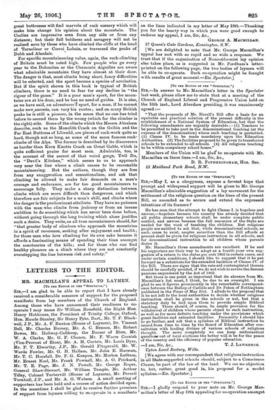[To THE EDITOR OP THE "Eincornoi.") SIR, — May I, as a
clergyman, express a fervent hope that prompt and widespread support will be given to Mr. George Macmillan's admirable suggestion of a lay movement for the settlement of the religious question on the lines of the present Bill, so amended as to secure and extend the expressed intentions of its framers He has seen that the attempt to fight Clause I. is hopeless and unwise,—hopeless because the country has already decided that all public elementary schools shall be under complete public control, and unwise because the full resources of the State are needed for the work of teaching the children. But religious people are entitled to ask that, while denominational schools, as such, cease to exist, ampler securities than the Bill affords at present shall be given for religious instruction in all schools, and for denominational instruction to all children whose parents desire it.
Mr. Macmillan's three amendments are excellent. If he and his supporters see their way to adopt as a fourth your own sug- gestion of a return to the status quo ante 1902 in certain cases, and under certain conditions, I should like to suggest that it be put forward as a substitute for the extended facilities of Clause IV. of the Bill. There are signs that the rate-aid contemplated therein should be carefully avoided, if we do not wish to revive the fiercest passions engendered by the Act of 1902. But there is one point so important that its absence from Mr. Macmillan's list must, I think, be due to an oversight. I am glad to see it figures prominently in the remarkable correspond- ence between the Bishop of Carlisle and Dr. Paton of Nottingham published in the Times of May 21st. I allude to the proposal that it be not left to the local authorities to decide whether religious instruction shall be given in the schools or not, but that a statutory duty be laid upon them to provide simple Biblical teaching. There should, of course, be ample provision for the withdrawal of children whose parents object to such instruction, as well as for more definite teaching under the provisions which grant facilities and extended facilities. Personally I should like to go further, and ask that a syllabus of Biblical instruction be issued from time to time by the Board of Education after con- sultation with leading divines of various schools of religious thought. The more completely we can keep ecclesiastical questions out of local elections the better will it be for the peace of the country and the efficiency of popular education.
—I am, Sir, &c., T. J. LAWRENCE.
Upton Lovel Rectory, Wilts.
[We agree with our correspondent that religious instruction in all State-supported schools should, subject to a Conscience Clause, be part of the law of the land. We see no objection to, but, rather, great good in, his proposal for a model syllabus.—ED. Spectator.]










































 Previous page
Previous page